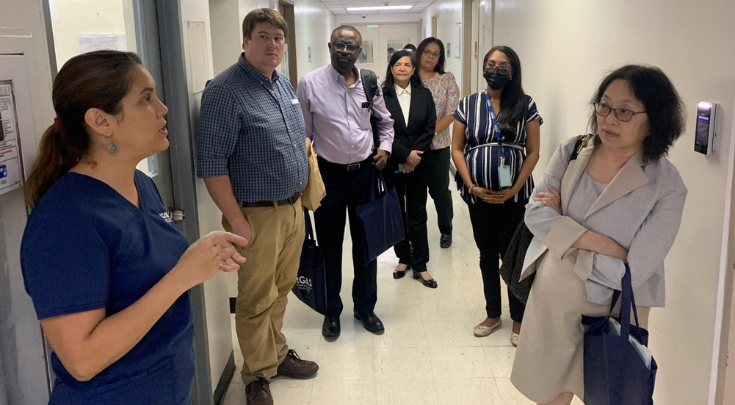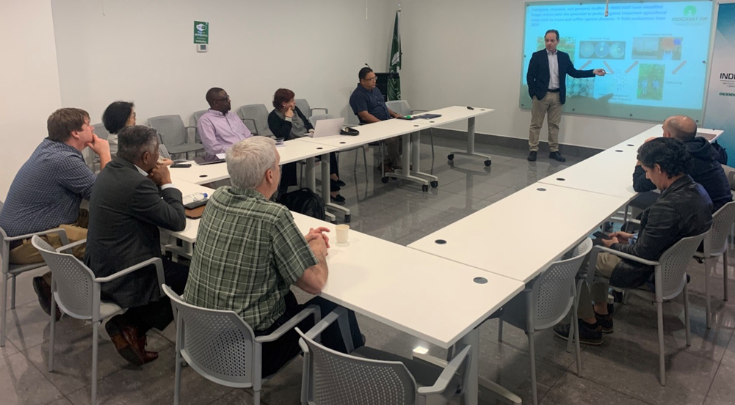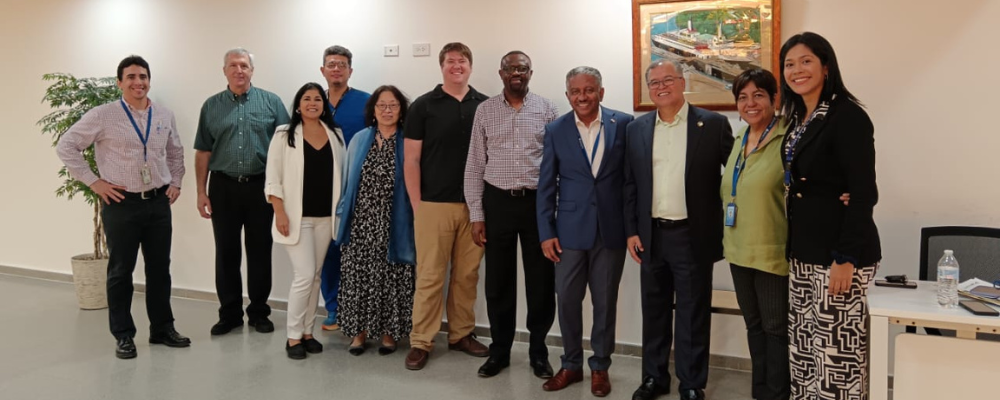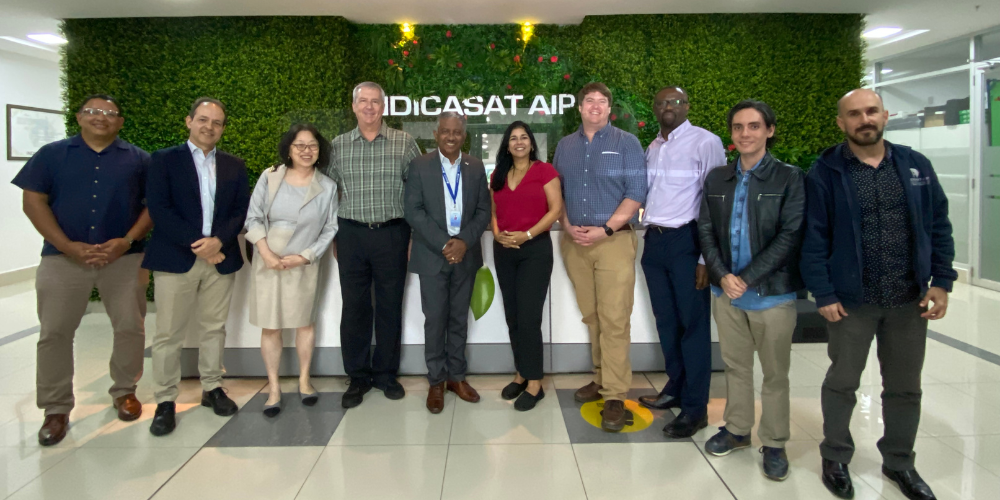A team of USF Health professors representing the USF Genomics and Internal Medicine-Infectious Disease traveled to Panama in February. The delegation was focused on strengthening existing Panamanian partnerships, discovering new programs and visiting local health institutions, while providing a forum for the USF faculty to share current research projects.
The four-day visit was coordinated by USF College of Public Health (COPH) Associate Professor Dr. Arlene Calvo. She directs the Panama Program at the City of Knowledge, where the COPH has operated a program for 20 years, and is a lead member of the Salud Latina USF initiative. Panama’s National Secretary of Science Dr. Eduardo Ortega served as host.
“This initiative brought together scientists from Panama and USF,” Calvo said. The USF Health delegation included Drs. John Adams, Kami Kim, Francis Ntumngia and Ryan McMinds.

Dr. Sandra López, a researcher and virologist, presents to the group during a tour of the Gorgas Memorial Institute. (Photo by Dr. Arlene Calvo)
The team visited the Secretary of Science, Technology and Innovation (SENACYT), Institute for Advanced Scientific Research (INDICASAT), City of Knowledge, City of Health, Gorgas Memorial Institute and the Smithsonian Tropical Research Institute. During each agency stop, staff presented their area of work, provided tours of the facilities and identified opportunities to generate collaborations on research and academia. Some of the research topics that were discussed included neuroscience, aging studies, medical genetics, oceanography and sustainability.
“INDICASAT’s recently established genomics program could serve as an opportunity to work in this field as partners,” Calvo said. “Several other Panamanian agencies were interested in bioinformatics capacity building and research as it relates to developing anti-malaria drugs and vaccines.”
During the agency visits, the USF Health delegation shared how they are making life better with impactful research gains in malaria, toxoplasmosis and vaccine discovery.

Dr. Ricardo Lleonart, director of the INDICASAT research institute, presents to the USF delegation. (Photo by Dr. Arlene Calvo)
“They presented to a full house of more than 50 Panamanian scientists, sparking ideas for collaborations,” Calvo said. “It was a wonderful to witness researchers in their respective fields from Panama and USF united around the common goal of nurturing and building new relationships.”
Adams noted, “They are most eager to see what future collaborations will bloom between Panama and USF.”
“It was a pleasure meeting the different groups at SENACYT, INDICASAT, the Gorgas Institute, City of Health and City of Knowledge and to learn about the different projects ongoing and plans for the nearest future,” Ntumngia added. “I was particularly pleased with the enthusiasm and optimism of Dr. Ortega and the time he and Dr. Calvo took to show us around all the different institutions.”
According to Calvo, the participants hope to be able to collaborate on different health trainings involving vaccines and bioinformatics, submit joint grant applications and coordinate international research projects and conferences.
Although they were not physically present for the meetings, students were a central part of the conversations. Participants agreed to increase the exchange of students from USF to Panama and vice versa.
During a presentation, attendees learned that SENACYT currently offers international scholarships for Panamanian students to study master’s and doctoral programs in the health sciences. “This could serve as an opportunity to further cultivate the training of Panamanian professionals at USF, as it has previously and is currently being done,” Calvo said.
A central mission of the USF delegation was to promote the different public health programs that thrive at the university. Adams presented to attendees at each of the distinct visits and stressed the need based on data shared in previous sessions.
Adams shared, “It was noted during the meeting at SENACYT that Panama needs 1,000 scientists per 1 million inhabitants. Presently, there are approximately 200 scientists per 1 million inhabitants for a total population of 4.5 million people. This highlights the need to train more Panamanians in sciences and enhance international collaborations.”
 Participants on a visit to the City of Health, from left, Drs. Juan Carlos Batista,
John Adams, Arlene Calvo, Roderick Chen, Kami Kim, Ryan McMinds, Francis Ntumngia,
Eduardo Ortega, Silvio Vega, Luz Romero, Estefani Sánchez. (Photo courtesy of Calvo)
Participants on a visit to the City of Health, from left, Drs. Juan Carlos Batista,
John Adams, Arlene Calvo, Roderick Chen, Kami Kim, Ryan McMinds, Francis Ntumngia,
Eduardo Ortega, Silvio Vega, Luz Romero, Estefani Sánchez. (Photo courtesy of Calvo)
Panama continues to evolve. Some of their new projects include:
- A new vaccine research and innovations center
- A biopharmaceuticals hub that nurtures regional collaborations with organizations such as the Pan American Health Organization
- A regional presence for the Centers for Disease Control and Prevention
- The City of Health, which will house the Social Security Agency
- Ultra-modern hospitals
- The University of Panama Medical School
- The National Oncology Institute
- The Gorgas Memorial Institute campus, which will serve as a mecca for health research
“The City of Health will act as a regional center for Central America on preparedness and collaborations, enhancing the public health research hub in Latin America,” Calvo noted. “Plus, there are many other international agencies with a presence at the City of Knowledge.”
A proud USF alumna, Calvo declared, “USF, represented by USF Health and the College of Public Health, is right in the middle of this exciting transition!”
